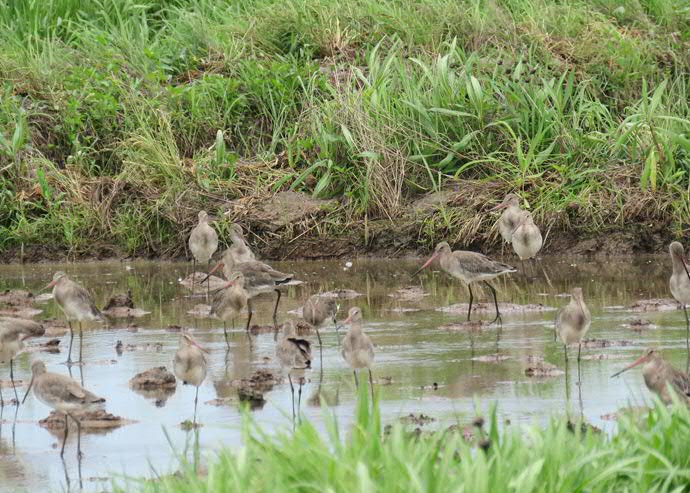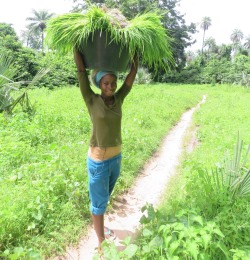Afrikaanse rijstboer lijdt honger door Nederlandse zuivel

Grutto's die na het broedseizoen vanuit Nederland terugvliegen naar Afrika, komen daar steeds vroeger in het jaar aan. Dat brengt de Afrikaanse rijstboeren in grote problemen. Kwamen grutto’s vroeger pas in augustus terug, nu, door de veranderde bedrijfsvoering van Nederlandse melkveehouders, vaak al in juli. De Afrikaanse boeren hebben dan net hun rijst ingezaaid, die steeds vaker verdwijnt in gruttomagen. Dat ontdekten Jos Hooijmeijer en Haije Valkema van de Rijksuniversiteit Groningen afgelopen maand tijdens een expeditie naar de Casamance, een gebied in het zuiden van Senegal waar veel rijst wordt verbouwd.
Het team van de Conservation Ecology-groep van de Rijksuniversiteit Groningen (RUG) bestudeert al twaalf jaar grutto’s in Zuidwest Friesland, onder andere door ze te voorzien van satellietzenders (http://volg.keningfanegreide.nl/). Uit de peilingen bleek dat de Casamance in Senegal een belangrijk gebied is voor onze grutto’s. De Groningse onderzoekers troffen daar half augustus inderdaad duizenden vogels aan. Die bevonden zich voornamelijk in de rijstvelden, waar ze zich tegoed deden aan de pas gezaaide rijst.

Wanhopige rijstboeren
‘Tijdens het werk werden we letterlijk dagelijks aangeklampt door wanhopige rijstboeren die hun rijst zien verdwijnen in de magen van hongerige grutto’s’, vertelt Jos Hooijmeijer. ‘Zij zien de vogels de afgelopen twintig jaar steeds vroeger terugkeren uit Nederland. Om die reden zijn veel boeren inmiddels afgestapt van het direct inzaaien van de rijstvelden. In plaats daarvan zaaien ze de rijst nu voor op kiembedden tussen de huizen, waar grutto’s niet durven te komen. Daar worden de kiemplanten verzameld, naar de rijstvelden gebracht en handmatig geplant: een enorme hoop extra werk! Uit ruimtegebrek ontkomen de boeren er niet aan om ook kiembedden in meer open gebieden aan te leggen. Daar weten de grutto’s ze snel te vinden.’
Nederlands graslandbeheer
De oorzaak voor de versnelde terugkeer van de grutto’s heeft alles te maken met de veranderingen in de bedrijfsvoering van de meeste Nederlandse melkveehouderijen. Om de productie te verhogen worden graslanden sterk ontwaterd, zwaar bemest, geëgaliseerd en ingezaaid met steeds hoger productieve grassoorten die steeds vroeger in het voorjaar kunnen worden gemaaid. Het is inmiddels breed geaccepteerd dat dit de drijvende factor is achter het grootschalige verdwijnen van weidevogels waaronder de grutto. Het lukt ze simpelweg niet meer om genoeg kuikens groot te krijgen. Meer dan 80% van grutto’s zien tegenwoordig hun broedpoging mislukken en vertrekt vroegtijdig uit Nederland.
Ondoordringbaar
Niet alleen de vogels die hun legsel verloren, ook de succesvolle vogels vertrekken tegenwoordig soms al eind juni. Dat komt omdat de sterk ontwaterde productiegraslanden de vogels na het broedseizoen niets meer te bieden hebben: de bodem is ondoordringbaar geworden voor gruttosnavels op zoek naar wormen. Senegalese rijstboeren krijgen daardoor een groot deel van de Nederlandse gruttopopulatie over de vloer op het moment dat ze daar totaal niet op zitten te wachten. Hooijmeijer: ‘Op deze manier bedreigt onze agro-industrie niet alleen het voortbestaan van de grutto, maar ook van Afrikaanse rijstboeren 5.000 km ver weg.’
Meer informatie
- Contact: Drs. Jos Hooijmeijer, Groningen Institute for Evolutionary Life Sciences (GELIFES), Rijksuniversiteit Groningen
Meer nieuws
-
17 februari 2026
De lange zoektocht naar nieuwe fysica
-
10 februari 2026
Waarom slechts een klein aantal planeten geschikt is voor leven
